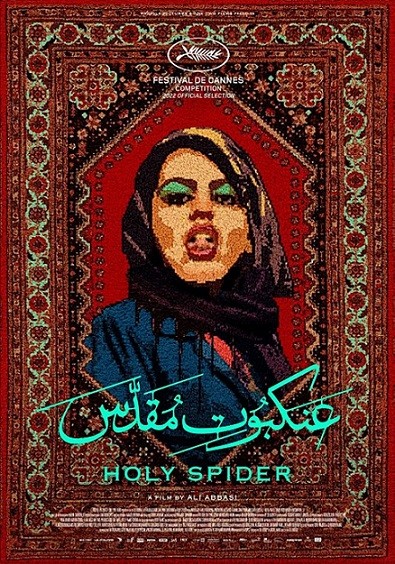Holy Spider
Introduction
It is a start of a fresh week and I decided to keep up with some of the International films doing the rounds currently. And with that I finished watching the Iranian film Holy Spider which is Denmark’s Official Entry To athe Academy Awards this year. Why not Iran’s entry you may ask? This is because the film was banned there due to its explicit content and its bold theme. The film had earlier premiered at the Cannes Film Festival earlier this year and there were reports of the film having extensive intimate scenes and n*dity which was kind of unheard of, for an Iranian film. But it did make the right kind of noise to get me interested particularly because this was a serial killer film! And if you have been following my reviews then the serial killer films are my bread and butter. So amidst all the other nominations, I had my eyes on Holy Spider and last night I happened to watch it. Is it worth your time, lets find out!
Story & Screenplay
Loosely based on true events, Holy Spider follows the story of a serial killer who is on the hunt for women ‘who sell their bodies’. What is his motive? Now, I wouldn’t be wrong if I say that this is a very different kind of a serial killer film. In fact at the core of it, it is a searing commentary on the patriarchy that is prevalent in our society. The screenplay standing at less than 120 minutes does make for a compelling watch. Please note that this section will contain mild spoilers, so viewers discretion is advised!
The drama opens with a graphic scene featuring a lady n*de and standing in front of the mirror getting dressed up while the camera does pan on her back which has red marks on it. This itself was the portrait of feminism veiled by marks on patriarchy on her back, a theme which would eventually be explored further through the running minutes of the film. We learn that the lady is does sell her body to earn a living for her family that also features a child. What seemed like a normal night of work turns topsy-turvy once she is picked by a stranger and strangulated to death.
The drama here is NOT a whodunnit unlike many other serial killer films. The identity of the serial killer is revealed early on as we get to know that he is an average joe living with his wife and two kids. This was a bit of a shocker considering ‘how regular’ his life otherwise was. There is a parallel track featuring a female journalist who is newly assigned the case of the killings. She is undergoing her own identity crisis of a lone female in an otherwise male world. Through a few exchange of dialogues, we get to know that she was earlier fired from her previous job after she refused to sleep with her editor. This is the start of the reflection of patriarchy that is prevalent in our society.
There are constant hints thrown in on how difficult is to reside and survive in a male dominated society. A simple scene involving a policeman coaxing the female journalist to share a cigarette, with that being a sign that she is ‘interested’ in him, makes for a poignant viewing. The drama does not compromise on violence and gore. There are extensive scenes of strangulations that would make you squirm in your seat. Yet, you are curious to know the reason behind the murders despite the fact that you are already are half-expecting it. There are concepts of religion that are smartly integrated in the drama.
The drama is consistently engrossing and engaging while keeping the viewers on their toes. It does get overwhelming at times too as the bodies begin to pile up(and you are aware that this is based on a true story). The entire sequence featuring the female journalist using herself as a bait only to barely escape from the cusps of the killer makes for a compelling viewing. But the real exposé begins from the time the serial killer is arrested.
The final 40 minutes are dedicated to the court trial and I was appalled at the public reactions who called him ‘innocent’ and someone who was ‘just cleaning up sinful women’. I was honestly boiling with anger at this point which unfortunately was a stark reality of today’s times. The belief itself was so ridiculous that I couldn’t help but think that it was this very belief that was blinding so many people. To top it, even the authorities were inclined towards the accused and only because of the ongoing media coverage did they have to sound a verdict that was appropriate. The writers also try showcasing the side of one of the victim’s family who we are told are really poor. And they too were blaming their daughter for it while open to accepting a compensation amount. Hypocrisy!
One aspect of the drama that really did move me was the final scene that was so powerful and left me with many thoughts in my head. It was a scene featuring the son of the protagonist who was enacting the entire crime scene with his sister. He did also state that his father was innocent and that if he was punished then there would be someone else who would stand up and continue ‘the remaining work'(of killing off women who sell their bodies). This made me realise on how much of an impact a patriarch can have on his children particularly the ‘next patriarch in line’. A word of advice to the parents – teach your son on how to respect women from the very beginning and also set an example! Overall, the screenplay was a powerful portrayal of patriarchy veiled as a serial killer drama!
Dialogues, Music & Direction
The dialogues are poignant and often make you think through the various conversations that unfold. And this does make for an impactful viewing. The BGM is subtle and never overpowers the drama in any manner. The cinematography does give a good sense of the area where the drama is set in. It is often complimented by the lightening that paints a grim picture. Director Ali Abbasi does a spectacular job in creating a drama that is unapologetic, unabashed and deeply submerged in reality of today’s times. The direction deserves distinction marks for painting a grim picture of patriarchy in the wake of a serial killer drama.
Performances
The performances are astounding here. Arash Ashtiani as Sharifi has his moments to shine. Forouzan Jamshidnejad as Fatima is wonderfully understated as the oblivious wife of the protagonist. Zar Amir-Ebrahiminas Rahimi signifies the sole representation of feminism standing amongst the elements of patriarchy and she does a marvelous job! Mehdi Bajestani as Saeed is intimidating and bone chilling in a brilliantly layered character which will leave you fuming often! Excellent acting!
Conclusion
Holy Spider is a chilling portrayal of patriarchy and belief that makes for a stunning watch. Highly Recommended!




